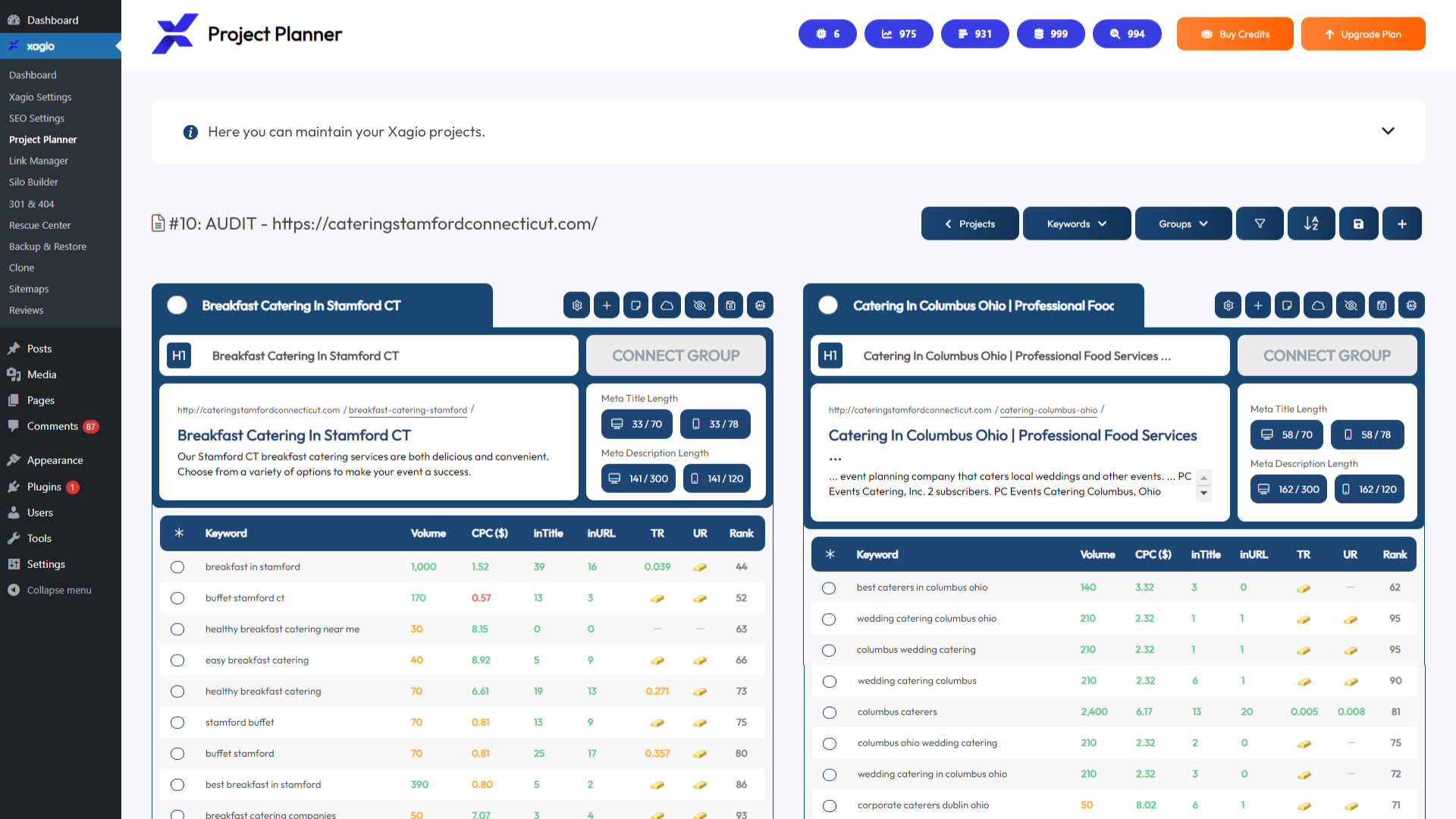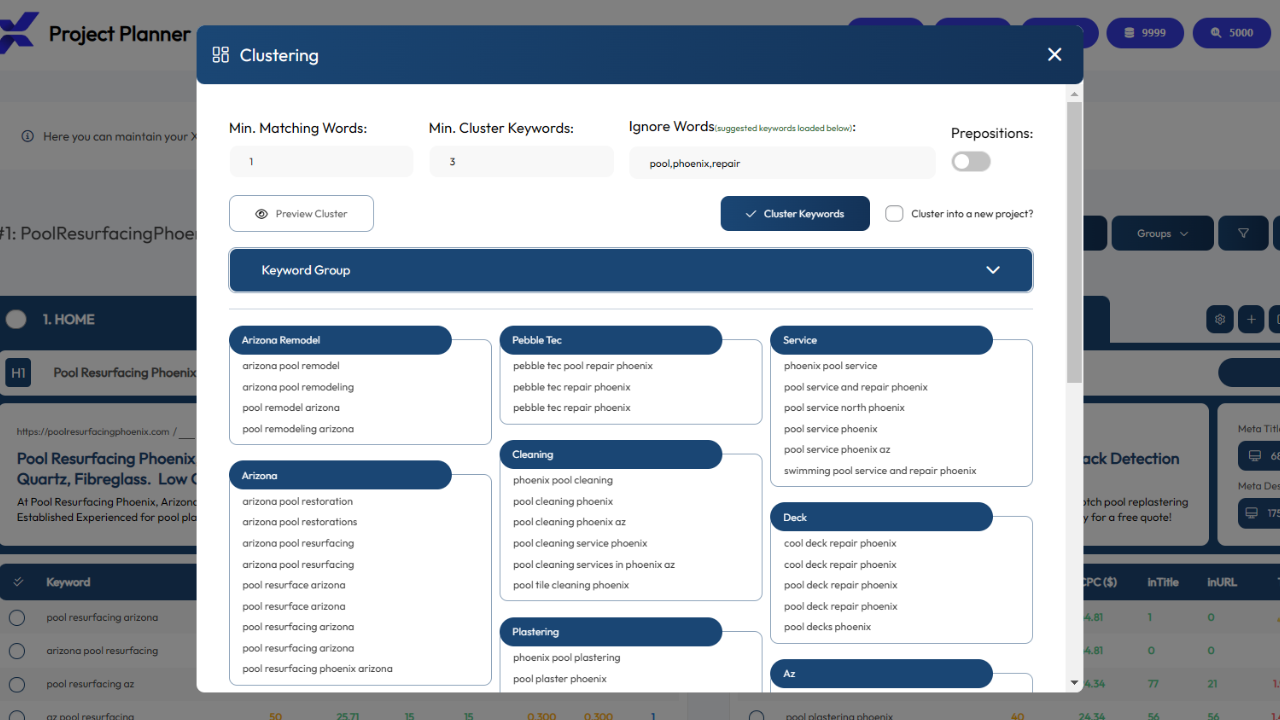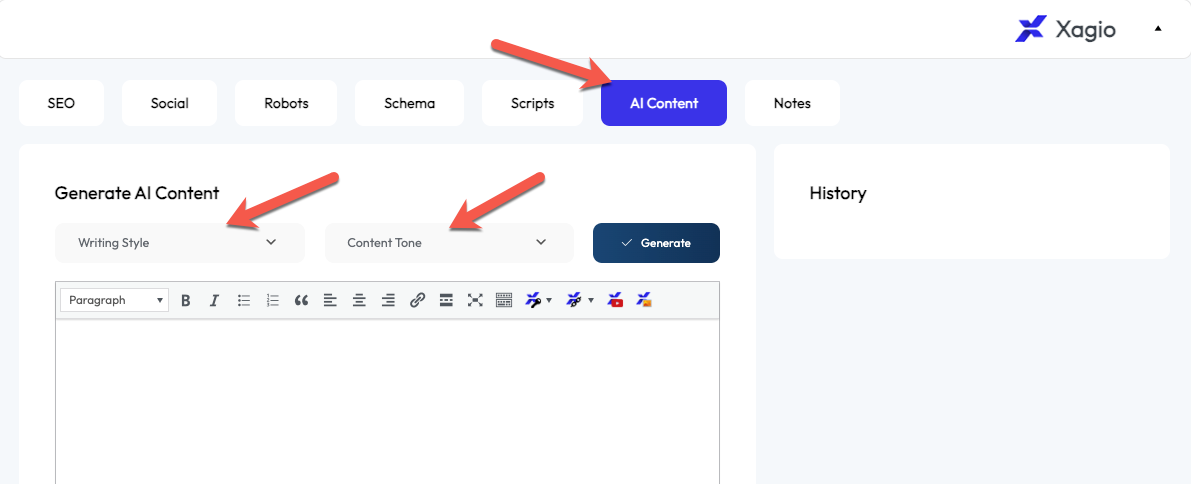Find Out How Our Proprietary AI Tools Add Ease And Speed To Your SEO Efforts
Artificial intelligence has become a global buzzword, with companies in every industry trying to figure out how to boost productivity as a flood of AI tools hits the market.
The SEO industry is no different, and the last 18 months have been quite a rollercoaster with experts trying to figure out what does and doesn’t work.
Here at Xagio, we’ve made it our mission to create the most advanced AI SEO tools based on extensive research and testing to ensure users see consistent results (rather than the all-too-common guesswork you see everywhere).
In this blog post, I want to show you precisely what AI SEO tools can do for improved search engine rankings and introduce you to Xagio’s features that deliver proven results with ease and faster than ever before.
What Does AI SEO Mean?

AI SEO refers to the practice of using Artificial Intelligence (AI) tools to automate and streamline SEO tasks that boost a website’s rankings in search engines.
The main idea is to use AI SEO tools to speed up tasks that tend to be extremely time-consuming, but there is also an opportunity for AI to reduce the risks of human errors.
Essentially, the goal is for SEO professionals to get work done faster and more accurately, especially when it comes to KW research and content creation.
The tricky part has been trying to teach a machine learning AI tool to perform very complex tasks and follow specific instructions–and that’s where the last 18 months have brought about some exponential improvements.
Let me explain.
Is AI SEO Completely New?
No, AI for SEO isn’t new, but the capabilities that have become available in the last 18 months have completely revolutionized things in the industry.
The first massive breakthrough for the general public came with free AI SEO tools like ChatGPT.
Professionals in banking, accounting, software development, customer service, and SEO were instantly amazed at how accurately and fast this tool could answer even the most complex questions.
However, as with all new technology, there were plenty of flaws (like AI hallucinations), and people quickly realized that it took skillful imagination to come up with prompts that would deliver consistent results.
That’s why I spent endless days and weeks with my team figuring out how to design AI tools in a way that would reduce the need for SEOs to also become experts in AI prompts.
The result is one of the most advanced AI SEO tools available that takes care of the most important and time-intense tasks of every SEO strategy.
How Should You Implement AI Into Your SEO Strategy?
In this section, I want to show you how Xagio’s SEO tools will speed up and simplify some of the most critical tasks in order to achieve boosted rankings in search engines.
Here’s how I like to explain it. SEO comes down to three things:
- Keyword research
- On-page optimizations
- Backlinks
If you can get the first two right and speed up the process, the time and financial investment in backlinks will be greatly reduced.
And here’s how Xagio’s SEO tools will help you.
1. Keyword Research
Xagio has two AI tools specifically designed for KW research. While they work in a similar way, there are different situations where you might want to use them.
Spying on your competitors is one of the most effective ways to do KW research and content planning. The manual process usually involves tools like SEMRush and aHrefs to extract thousands of KWs and then manually analyze and sort them.
Xagio’s Audit tool uses AI technology to extract ranking keywords from a competitor website, along with data about the search volume, Google Adwords CPC, and the last known Google ranking.
All of this information is pre-clustered into groups based on how the competitor has set up their pages.
It’s powerful information that can help you create a foundation for your SEO and content strategy.
The second tool that we built into Xagio’s Project Planner is the AI Wizard.
This tool allows you to start by entering your main target keyword. Xagio then displays a list of websites in the SERPs, and you can choose one or more sites to use for your keyword research.
Once you choose the websites to use, Xagio then researches and analyzes keywords for which those websites are currently ranking. The main difference to the Audit feature is that Xagio then analyzes and clusters the keywords into topically related groups.
Xagio’s Project Planner also has tools that help you to further cluster the keyword groups, and I’ll get to that shortly.
The best part is that these tools work exceptionally well for affiliate, Rank & Rent, LeadGen, and local SEO projects.
2. Keyword Clustering
Once you have run Audits and Wizards for your SEO project, you might want to further analyze the KW lists to create better clusters for your content strategy.
And Xagio offers two features to help you with this.
The first one is the “Seed Keyword” tool, which allows you to specify a term to create a KW cluster. Xagio will then create a new KW group and pull all keywords that contain that term into it.
The second option is to use the “Cluster Keywords” tool, which works differently.
When you launch this tool, you can enter the minimum number of words in each keyword and the minimum number of keywords in each group. Xagio will then analyze all the KWs in the project and re-cluster them based on those input values.
3. On-Page Optimization
Once all your KW research is done and you’re happy with the clustered groups, you’ve got a solid foundation for all other SEO tasks.
One of the most critical steps in SEO projects is on-page optimization for meta tags.
There are three critical meta tags that you have to keyword optimize for every page on your site:
- H1 Tag
- SEO Title Tag
- Meta Description Tag
The problem is that it takes a ton of time and creativity to come up with fully optimized tags. Doing this manually will easily take 15 minutes per page–for a medium-sized site, that means many days of tedious and repetitive work.
Xagio’s AI Optimization tool removes that manual work by creating five suggestions for each of the three meta tags. This happens in less than 10 seconds, and you can then choose from the suggestions and make modifications if needed.
4. Content Creation
Now, we’re coming to a very hot topic in the SEO world: AI-generated content.
AI content tools started emerging about 2–3 years ago, but it wasn’t until ChatGPT came along that SEOs saw a major shift in the quality and ease of use.
Anybody who regularly uses ChatGPT (even the free version) will know how amazing it can be to get answers to questions (even complex ones).
And with the right prompts, you can get some pretty impressive content.
But there are a couple of problems for SEOs.
First of all, you have to be very specific in your prompts in order to get the right tone, level of detail, and even the right search intent for a topic.
Secondly, using AI tools typically means storing prompts in a text file, copy/pasting them into the prompt box, and then copy/pasting the result into your WordPress editor.
But with Xagio’s AI content tool and Chrome Extension, you get a far more integrated solution that saves time and effort.
In your WordPress editor, simply head to the AI Content Section, set the Style and Tone, and Xagio will generate a content outline.
The best part is that we developed the tools to help you start with a simple content outline and then gradually add high-quality content until your page is complete.
Within a few minutes, you can turn a rough content outline into a complete web page without any AI prompt or content writing skills.
5. Schema Automation
Another extremely time-consuming task that has to be part of every SEO strategy is adding schema markup generation for all web pages.
The reason this is an important step is that schema markup provides search engines with more information about the content of a page, whether it’s a local business, a product review, or a meal recipe, to name just a few examples (there are thousands of schema types).
Schema markup can also influence how your website appears on search engine results pages, helping you gain more real estate or visual impacts like star ratings that can influence click-through rates.
With Xagio, you have the option to duplicate competitor schema or use AI to generate a schema in less than 10 seconds. This schema will be optimized for the type of site, and the automated process will save you many days of manual work.
It’s also manual work that is prone to human error, which Xagio completely eliminates.
Start Using Xagio’s AI Tools
With critical tasks like keyword research and on-page optimization being so time-consuming, they are the best candidates for automation using AI.
That’s why we expanded Xagio’s features to eliminate 99% of the time and effort involved in search engine optimization.
Get started with Xagio today and find out how fast and easy it is to complete the most time-consuming and critical tasks to boost your organic traffic.
Also, make sure you have enough XAGS in your account to use premium AI features. You can find out more about topping up your XAGS on our introduction page.


